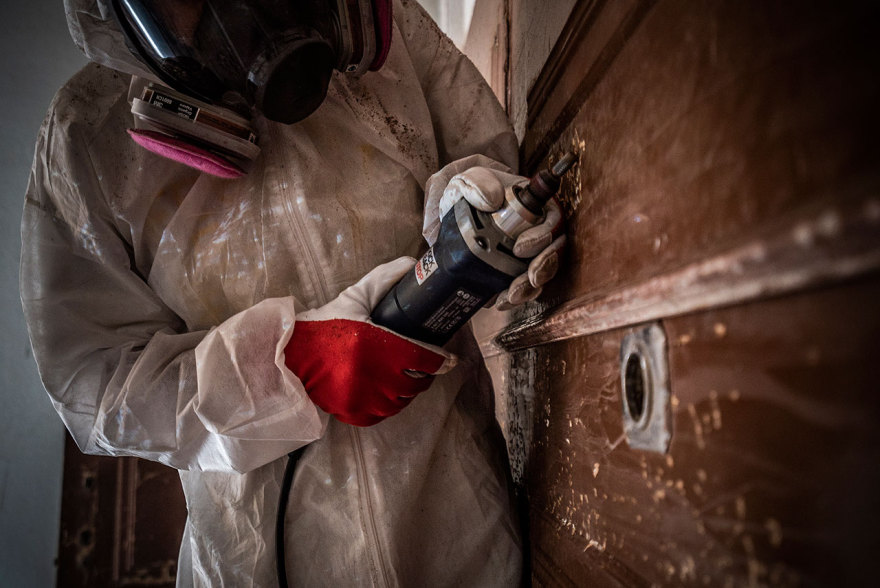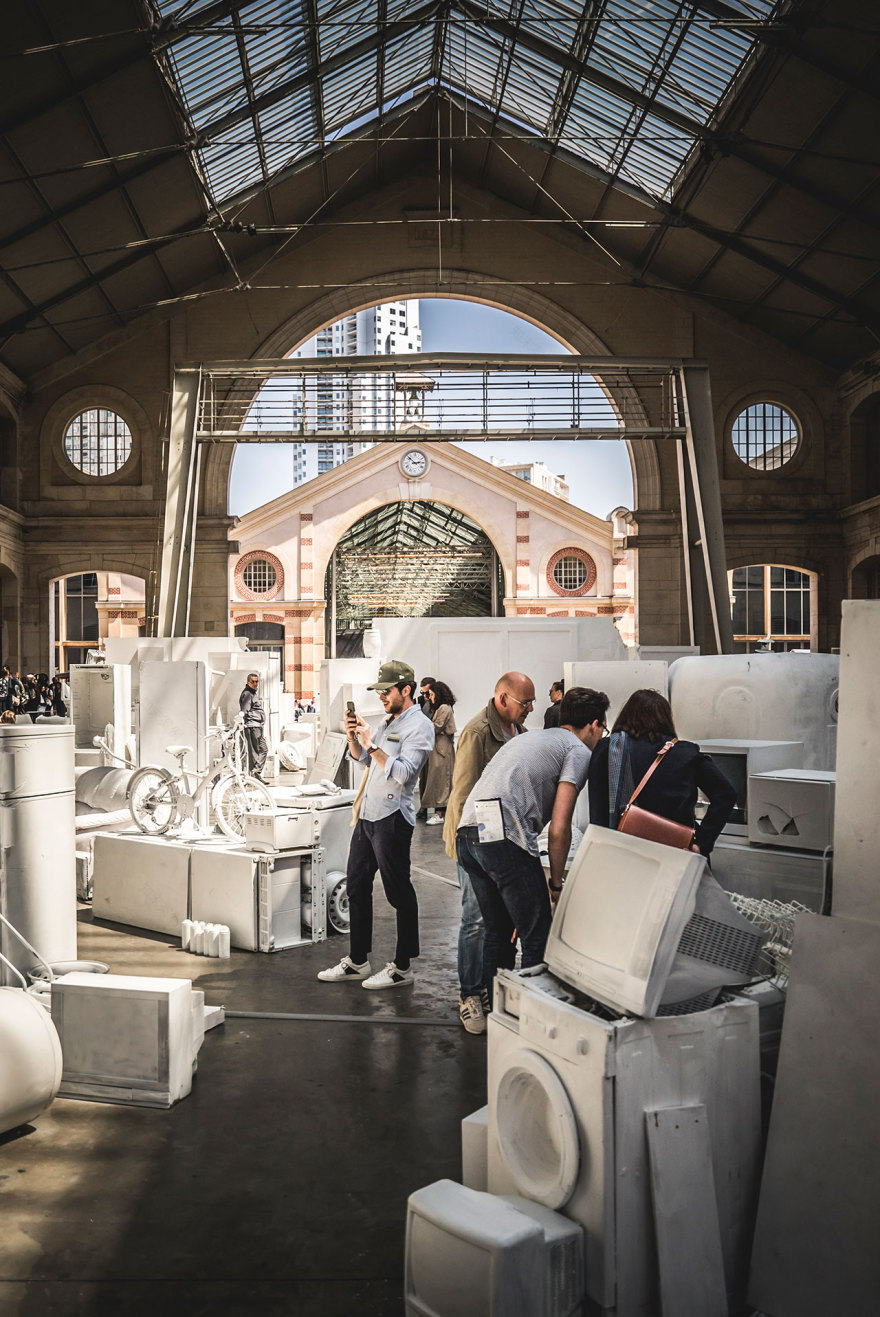查看完整案例


收藏

下载

翻译
Title: Fragments Urbains
Posted In: Street Art , Exhibition
Duration: 19 May 2018 to 29 July 2018
Venue: Centquatre
Opening Hours: Tue–Sun 2 p.m.–7 p.m.
Telephone: +33 1 53 35 50 00
Street art is usually associated with graffiti, a process of superimposition whereby the artist sprays or paints over some kind of publicly viewed surface, so it’s no wonder that Portuguese urban artist Alexandre Farto , who goes by the moniker VHILS , has won international acclaim for his groundbreaking bas-relief carving technique that basically does the reverse: instead of adding new layers on top of existing ones, he subtracts from what is already there. His meteoric rise since the early 2000s, which has seen his work showcased through numerous solo and group shows around the world, has presently culminated with not one but two solo exhibitions running concurrently is Paris. Organized in collaboration with Magda Danysz Gallery , “ Fragments Urbains ” at Centquatre is an ambitious, kaleidoscopic exhibition of the artist’s oeuvre showcasing some of his signature bodies of work as well as a selection of works in new mediums that reflect on globalization and the nature of contemporary urban societies. VHILS likes to experiment with new mediums and techniques manifested by the broad range of works on display, from carved wooden doors, Styrofoam sculptures and engraved metal, to layers of carved posters, acid painting and videos. At the same time, “ Décombres ” at Magda Danysz Gallery functions as a project room for the work at Centquatre, with a unique installation on the ground floor and new works on the first floor.
VHILS, Fragments Urbains making of. Photo by Jose Pando Lucas.
VHILS, Fragments Urbains making of. Photo by Jose Pando Lucas.
VHILS, Fragments Urbains exhibition view at Le Centquatre-Paris. Photo by Jose Pando Lucas.
VHILS, Fragments Urbains exhibition view at Le Centquatre-Paris. Photo by Jose Pando Lucas.
VHILS, Fragments Urbains making of. Photo by Jose Pando Lucas.
VHILS started his career in his hometown of Seixal, an industrialized suburb across the river from Lisbon, where as a teen he graffiti-ed his way around the city both as a reaction to the area’s hectic development and as a vehicle for his creativity. In his search for a more meaningful interaction with the urban fabric, he came up with his signature technique of digging into the countless layers of posters, dirt, and plaster that had accumulated on the city’s walls to create relief portraits through a process that can be described as reverse stencil. Using chisels and jackhammers in the beginning and later moving on to acid, bleach, pneumatic drills, and even explosives, VHILS’ carved portraits of anonymous people uncannily appear both ephemeral and timeless. Although they look brittle and accidental, at the same time it’s as if they were always there, buried underneath the superficial layers of the city . In this sense, VHILS can be considered to be a contemporary urban archaeologist, revealing what lies beyond the visible and exposing the city’s past that has been superseded by the ferocious momentum of the present.
VHILS, Décombres exhibition view at Magda Danysz Gallery. Photo by Jose Pando Lucas.
VHILS, Décombres exhibition view at Magda Danysz Gallery. Photo by Jose Pando Lucas.
VHILS, Décombres exhibition view at Magda Danysz Gallery. Photo by Jose Pando Lucas.
VHILS, Fragments Urbains exhibition view at Le Centquatre-Paris. Photo by Jose Pando Lucas.
VHILS, Fragments Urbains exhibition view at Le Centquatre-Paris. Photo by Jose Pando Lucas.
VHILS, Fragments Urbains exhibition view at Le Centquatre-Paris. Photo by Jose Pando Lucas.
The “Scratching the Surface” project that evolved through these experimental relief portraits gave value to the abandoned walls in Seixal and eventually to many more locations around the world, turning ordinary individuals into icons and revealing the close relationship between a city and its dwellers in the most original way. Part urban regeneration, part symbolic gesture, VHILS’ artistic endeavours dissect the accumulated layers of history and culture in an effort to bring to the surface something that speaks of our essence amidst the excess of information that is constantly being piled on top of us. In a world caught in constant globalization and consumerist frenzy, the artist questions how these processes are affecting us and how far we are ready to go in the name of this short-term contentment. These questions reverberate throughout the labyrinthic spaces of Centquatre , a public cultural centre in Paris’ 19th arrondissement that is presently hosting VHILS’ first monographic show in France. Modelled after the period’s grand train stations and exhibition halls, the 19th century glass and brick industrial building provided funeral services for Parisian citizens for over 120 years. Renovated just ten years ago, the venue now offers 25,000 square meters for cultural happenings including a series of exhibition spaces whose unique heritage, so closely interlinked with the city and its citizens, couldn’t be a more suitable backdrop for the artist’s urban artwork to unfold.
VHILS, Fragments Urbains exhibition view at Le Centquatre-Paris. Photo by Jose Pando Lucas.
VHILS, Fragments Urbains exhibition view at Le Centquatre-Paris. Photo by Jose Pando Lucas.
VHILS, Fragments Urbains exhibition view at Le Centquatre-Paris. Photo by Jose Pando Lucas.
VHILS, Fragments Urbains exhibition view at Le Centquatre-Paris. Photo by Jose Pando Lucas.
VHILS, Fragments Urbains exhibition view at Le Centquatre-Paris. Photo by Jose Pando Lucas.
VHILS, Fragments Urbains exhibition view at Le Centquatre-Paris. Photo by Jose Pando Lucas.
Taking over six large spaces at Centquatre, VHILS’ “Fragments Urbains” showcases the artist’s innovative approach and daring sensibility by presenting a different technique in each room: wood carving, layers of carved posters, acid painting, engraved metal, Styrofoam sculptures and video. All of the works on display are new and stem from a comprehensive process of urban exploration whereby the artist immerses himself in the city he is working on, photographing it, drawing it and meeting its inhabitants. Most ambitious in scale is the dystopian, all-white cityscape that unfolds in the venue’s most imposing hall. Comprised of hundreds of smaller and larger everyday objects, from microwaves, washing machines and satellite dishes to door frames, bicycles and cars, painted white and heaped into chaotic clusters, the assemblage poetically conveys the mounting debris that our consumerist society produces. At first glance, the same chaotic sensibility seems to define the artist’s sculptural installation next door made out of Styrofoam, an abstract landscape of extruded shapes gleaming in their whiteness amidst the darkened space. And in fact it takes a few moments to realize that the seemingly haphazard shapes in front of you actually form two faces which you can see reflected on a giant mirrored surface hovering above.
VHILS, Fragments Urbains exhibition view at Le Centquatre-Paris. Photo by Jose Pando Lucas.
VHILS, Fragments Urbains exhibition view at Le Centquatre-Paris. Photo by Jose Pando Lucas.
VHILS, Fragments Urbains exhibition view at Le Centquatre-Paris. Photo by Jose Pando Lucas.
VHILS, Fragments Urbains exhibition view at Le Centquatre-Paris. Photo by Jose Pando Lucas.
VHILS, Fragments Urbains exhibition view at Le Centquatre-Paris. Photo by Jose Pando Lucas.
VHILS, Fragments Urbains exhibition view at Le Centquatre-Paris. Photo by Jose Pando Lucas.
Other works include VHILS’ signature portraits, painstakingly carved out of myriad stacks of posters that have been compressed into two meter height blocks , set up like some kind of billboard cemetery, an assemblage of vintage inlay doors upon which the artist has carved portraits, decorative motifs or abstractions, and an immersive video installation where you are enveloped by an exuberant virtual cityscape. It is a truly mesmerizing exhibition that along with the works on display at Magda Danysz Gallery, which include new works in concrete, acid-etched metal plates, carved wooden doors and billboards , manages to vividly encapsulate the artist’s mantra that destruction is a form of construction as well as poetically reflect on the nature of our urban surroundings and our place therein.
VHILS, Fragments Urbains exhibition view at Le Centquatre-Paris. Photo by Jose Pando Lucas.
VHILS, Fragments Urbains exhibition view at Le Centquatre-Paris. Photo by Jose Pando Lucas.
VHILS, Fragments Urbains making of. Photo by Jose Pando Lucas.
VHILS, Fragments Urbains making of. Photo by Jose Pando Lucas.
VHILS, Fragments Urbains exhibition view at Le Centquatre-Paris. Photo by Jose Pando Lucas.
VHILS, Fragments Urbains exhibition view at Le Centquatre-Paris. Photo by Jose Pando Lucas.
VHILS, Fragments Urbains exhibition view at Le Centquatre-Paris. Photo by Jose Pando Lucas.
VHILS, Fragments Urbains exhibition view at Le Centquatre-Paris. Photo by Jose Pando Lucas.
VHILS, Fragments Urbains exhibition view at Le Centquatre-Paris. Photo by Jose Pando Lucas.
VHILS, Fragments Urbains making of. Photo by Jose Pando Lucas.
客服
消息
收藏
下载
最近





































